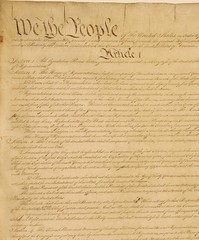We just had an election. Once it was over some people began talking about seceding. This is not the first time the United States has faced such a situation. I was reminded of that after seeing Lincoln. As we talked after the movie Laura asked why we fought rather than just letting the southern states leave. We talked about some of the implications of secession – it is certainly not a simple topic – but as I have been thinking about it I came to the conclusion that the fact that there is no provision for secession in the Constitution might need to be changed at some point. With that in mind I decided to draft such a provision to further explore the nuances of the concept of secession.
I would like to make it clear that I am not in favor of seceding at this time nor do I foresee a time when I would favor it but I think that creating a clear path for secession might be useful in making the possibility more understandable for those who might wish to consider it. In fact, if crafted correctly it might even serve as a deterrent to some who might pursue the idea without due consideration.
I based my draft on the concepts embodied in the provisions for the admission of new states (Article IV Section 3). Specifically I wanted to promote self determination, a deliberate process, and continued order. Here it is:
States may petition the Congress to secede from the Union. The Congress must vote on a treaty of secession within two years of the petition or else the petitioning state may offer its own treaty of secession which the Congress must vote on within 10 days. The President may not veto a treaty of secession unless he is a resident of the petitioning state or the treaty was drafted by Congress within the two years allowed. Secession shall not be completed until after a one year waiting period which begins after the Congress and the Legislature of the petitioning state have ratified a treaty of secession and after the Legislature and the people of the petitioning state have each voted in favor of secession in separate votes conducted at least 350 and no more than 400 days apart. If the treaty of secession is ratified more than four years after the vote of the residents of the seceding state, the residents of the seceding state must approve the treaty of secession in a popular vote during the one year waiting period.
During the one year waiting period the seceding state shall have all the rights and obligations of all other states in the Union. If the President is a resident of a seceding state the vice president shall assume the office of president at the beginning of the waiting period for the duration of the term.
Seceding states may be readmitted to the Union in the same manner as new states at any time but must remain independent from other political unions for a period of five years following their formal secession.
Parts of states may secede from the Union by first following the procedures to become a new state. In cases of a partial state secession a treaty of secession must be ratified by the Congress and the Legislature of the newly approved state and the one year waiting period must be observed but the people of the new state may vote in favor of secession prior to the creation of the new state and the legislature of the new state may vote in favor of secession anytime within the first 400 days after the creation of the new state regardless of when the people of the newly created state voted in favor of secession.
It was interesting to see what details came to my mind as I tried crafting this provision. I would love to hear from others if there are issues I have failed to address or if there are things you would change about this draft.
I’d also be interested in hearing any other thoughts about secession that anyone would care to share.

